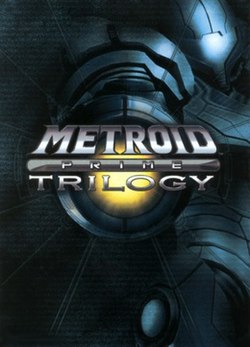Metroid Prime: Trilogy
| Metroid Prime: Trilogy | |
|---|---|

North American box art
|
|
| Developer(s) | |
| Publisher(s) | Nintendo |
| Composer(s) | Kenji Yamamoto |
| Series | Metroid |
| Platform(s) | Wii |
| Release | |
| Genre(s) | First-person action-adventure |
| Mode(s) | Single-player, multiplayer |
| Aggregate scores | |
|---|---|
| Aggregator | Score |
| GameRankings | 92.35% (34 reviews) |
| Metacritic | 91 (48 reviews) |
| Review scores | |
| Publication | Score |
| 1UP.com | B+ |
| Edge | 8/10 |
| Eurogamer | 9/10 |
| Game Informer | 9/10 |
| GamePro | |
| GameSpy | |
| GamesRadar | 9/10 |
| IGN | 9.5/10 |
| ONM | 94% |
| NGamer | 9.1/10 |
Metroid Prime: Trilogy is a compilation of action-adventure games developed by Retro Studios and published by Nintendo for the Wii video game console. It features three games from the Metroid series: Metroid Prime, Metroid Prime 2: Echoes, and Metroid Prime 3: Corruption. Prime and Echoes, which were originally released for the GameCube, were updated with many of the features that were first implemented in Corruption, such as a new control scheme based on the Wii Remote and a credits system that was supported by WiiConnect24.
The compilation was first announced by Nintendo in May 2009, and was released in North America on August 24, 2009; in Europe on September 4, 2009; and in Australia on October 15, 2009. It was not released in Japan, because the Prime and Echoes ports were released as standalone games in the New Play Control! collection for that region. In January 2010, Nintendo discontinued the title in both North America and Australia. Metroid Prime: Trilogy was well received by critics, with much praise to the new controls. In January 2015, the compilation was made available for download from the Wii U's Nintendo eShop.
The updated Wii versions of Prime and Echoes, which were released separately in Japan as part of the New Play Control! series, utilize the same Wii Remote control scheme introduced in Corruption. The Spring Ball ability featured in Corruption is also implemented in Prime and Echoes. The GameCube controller is not compatible with the Wii versions of Prime and Echoes, despite they were originally released for the GameCube console. Other updates include shorter load times, upgraded textures, bloom lighting, altered visual effects, and 16:9 widescreen capabilities; however, the heads-up display is always displayed at the original aspect ratio, causing it to be stretched horizontally when in widescreen mode.
...
Wikipedia
